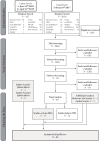Inside Out: A Scoping Review on the Physical Education Teacher's Personality
- PMID: 31781005
- PMCID: PMC6856217
- DOI: 10.3389/fpsyg.2019.02510
Inside Out: A Scoping Review on the Physical Education Teacher's Personality
Abstract
The teacher's personality in general plays an important role in the educational process. It is often examined in relation to outcome factors on the teacher or student side, e.g., teaching effectiveness or student motivation. Physical education (PE) with its peculiarities and allocated educational mandate particularly demands the personality of the PE teacher. Research considering this group of teachers is sparse, diverse and hard to capture due to different personality understandings. Our review therefore aims at identifying and analyzing underlying personality understandings, research questions and results of studies considering the personality of the PE teacher. We conducted a scoping review. After the screening and additional analyses process, 23 studies were included. Included references had to be empirical, published in German or English and explicitly examine the PE teacher's personality as variable or mention it as outcome factor in school context. All studies are cross-sectional, 22 studies quantitative, one qualitative. Regarding personality understandings, 12 studies follow a trait psychological, six studies a vocational, one study an interpersonal personality understanding. Four studies' personality understanding is not concretely determinable. Considering research questions, three studies aim at identifying the PE teacher's personality in general and do, e.g., not find considerable differences between the PE teacher's and other teacher's personality. Nine studies examine the relationship between the PE teacher's personality and different correlates such as burnout, highlighting, e.g., that female PE teachers' burnout process is less homogeneous than males. Eleven studies examine the PE teacher's personality from an external view and show, e.g., that students of different age groups perceive the PE teacher's personality differently. Our review offers possible practical implications. By e.g., knowing their personality structure - their inside -, PE teachers can play to their own strengths and make use of their individual personality configuration in order to teach authentically and successfully, i.e., transferring the inside to the outside. Due to partly questionable and fragmentary methodologies of the included studies, results have to be interpreted with caution. More studies considering the PE teacher's personality following a broad personality understanding are needed to include potentially relevant factors for teaching and by this receive evident insights.
Keywords: coach; personality; physical education; school; scoping review; sports; teacher; teaching competence.
Copyright © 2019 Schnitzius, Kirch, Mess and Spengler.
Figures
Similar articles
-
Who Are Our Students? Understanding Students' Personality for Refined and Targeted Physical Education. A Scoping Review.Front Sports Act Living. 2019 Sep 20;1:31. doi: 10.3389/fspor.2019.00031. eCollection 2019. Front Sports Act Living. 2019. PMID: 33344955 Free PMC article.
-
How culture shapes Chinese teacher's compassionate love.Int J Qual Stud Health Well-being. 2024 Dec;19(1):2357147. doi: 10.1080/17482631.2024.2357147. Epub 2024 May 20. Int J Qual Stud Health Well-being. 2024. PMID: 38768393 Free PMC article.
-
What makes a physical education teacher? Personal characteristics for physical education development.Br J Educ Psychol. 2021 Dec;91(4):1249-1274. doi: 10.1111/bjep.12415. Epub 2021 Mar 22. Br J Educ Psychol. 2021. PMID: 33754352
-
Gender differences in teachers' perceptions of students' temperament, educational competence, and teachability.Br J Educ Psychol. 2012 Jun;82(Pt 2):185-206. doi: 10.1111/j.2044-8279.2010.02017.x. Epub 2011 Jan 17. Br J Educ Psychol. 2012. PMID: 22583086
-
Examining dimensions of teachers' digital competence: A systematic review pre- and during COVID-19.Heliyon. 2023 May 26;9(6):e16677. doi: 10.1016/j.heliyon.2023.e16677. eCollection 2023 Jun. Heliyon. 2023. PMID: 37292364 Free PMC article. Review.
References
-
- Arbabisarjou A., Sourki M. S., Bonjar S. E. H. (2016). Students’ individual and social behaviors with physical education teachers’ personality. Int. Educ. Stud. 9 154–160.
-
- Bastian K. C., McCord D. M., Marks J. T., Carpenter D. (2017). A temperament for teaching? associations between personality traits and beginning teacher performance and retention. AERA Open 3 1–17. 10.1177/2332858416684764 - DOI
-
- Baumert J., Kunter M. (2011). “Das Kompetenzmodell von COACTIV,” in Professionelle Kompetenz von Lehrkräften - Ergebnisse des Forschungsprogramms COACTIV, eds Kunter M., Baumert J., Blum W., Klusmann U., Krauss S., Neubrand M. (Münster: Waxmann; ), 29–54.
-
- Baumert J., Kunter M. (2013). “The COACTIV model of teachers’ professional competence,” in Cognitive Activation in the Mathematics Classroom and Professional Competence of Teachers: Results from the COACTIV Project, eds Kunter M., Baumert J., Blum W., Klusmann U., Krauss S., Neubrand M. (New York, NY: Springer; ), 25–48. 10.1007/978-1-4614-5149-5_2 - DOI
Publication types
LinkOut - more resources
Full Text Sources


